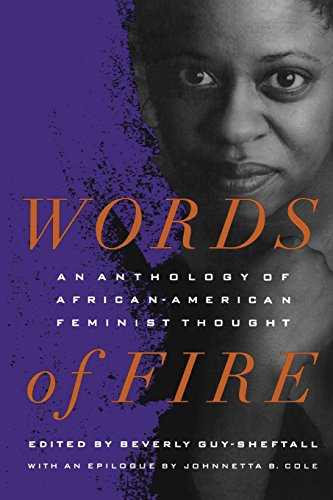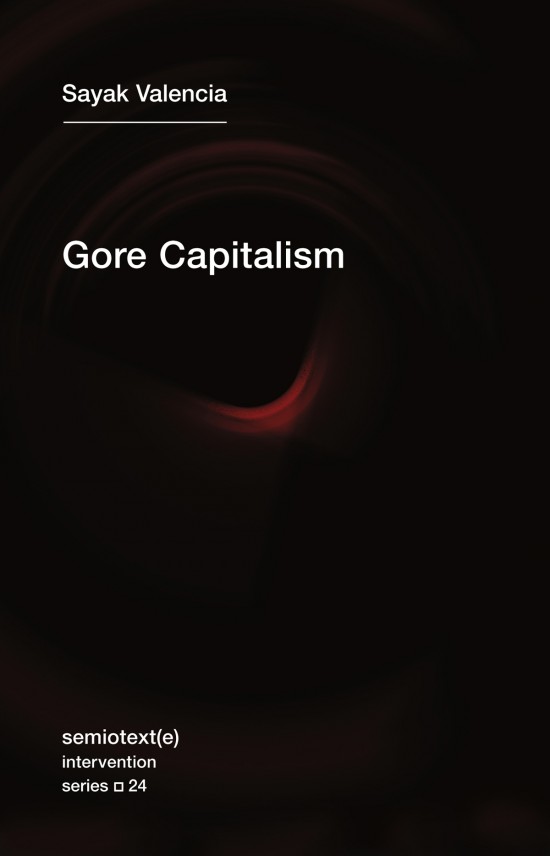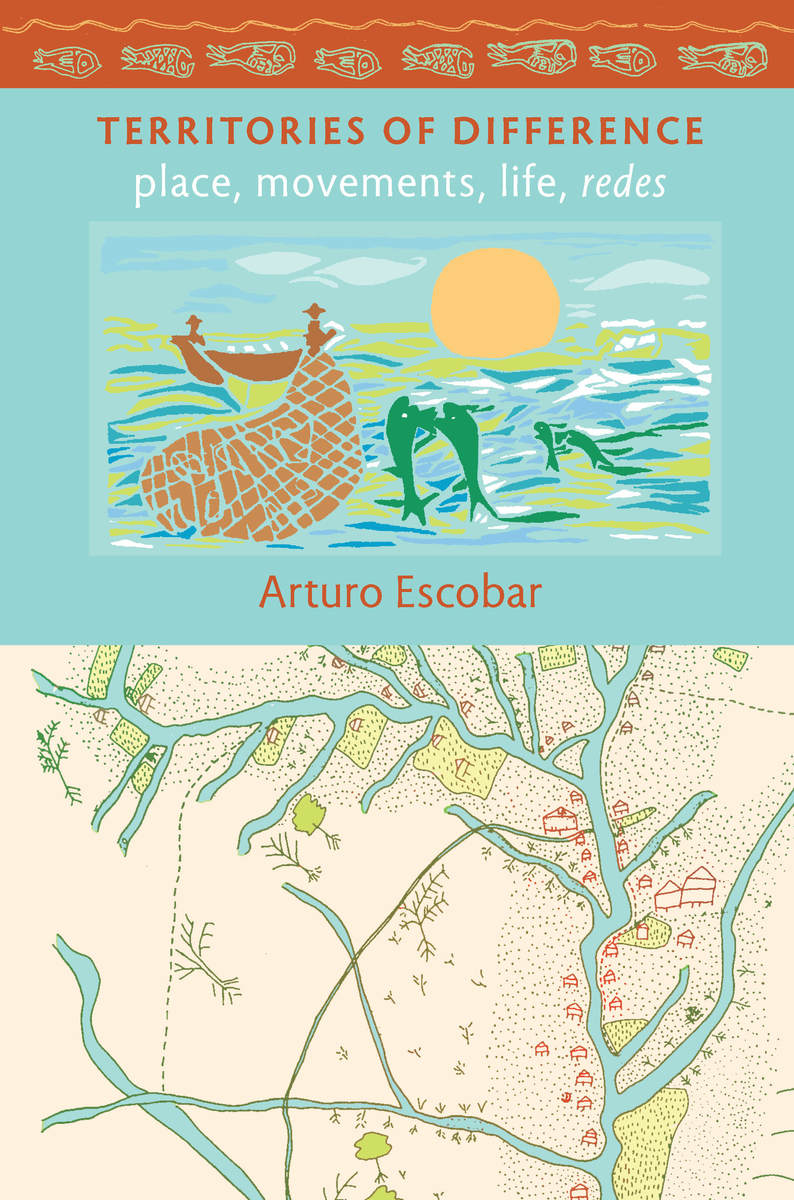Beverly Guy-Sheftall (ed.): Words of Fire: An Anthology of African-American Feminist Thought (1995)
Filed under book | Tags: · black people, body, civil society, class, feminism, gender, politics, race, reproduction, resistance, sex, sexuality, violence, women

“This anthology traces the development, from the early 1800s to the present, of black feminist thought in the United States, Words of Fire is Beverly Guy-Sheftall’s comprehensive collection of writings, in the feminist tradition, of more than sixty African American women. From the pioneering work of abolitionist Maria Miller Stewart and anti-lynching crusader Ida Wells-Barnett to the writings of contemporary feminist critics Michele Wallace and bell hooks, black women have been writing about the multiple jeopardies—racism, sexism, and classism—that have made it imperative for them to forge a brand of feminism uniquely their own.”
With an epilogue by Johnnetta B. Cole
Publisher The New Press, New York, 1995
ISBN 1565842561, 9781565842564
xxvi+577 pages
Reviews: Yvonne Chireau (Georgia Historical Quarterly, 1996), Kamili Anderson (Diverse, 2007).
PDF (6 MB)
See also This Bridge Called My Back: Writings by Radical Women of Color (1981) and Home Girls: A Black Feminist Anthology (1983).
Comment (0)Sayak Valencia: Gore Capitalism (2010–) [ES, EN]
Filed under book | Tags: · capitalism, death, feminism, necropolitics, neoliberalism, politics, violence

“Death has become the most profitable business in existence.”—from Gore Capitalism
“Written by the Tijuana activist intellectual Sayak Valencia, Gore Capitalism is a crucial essay that posits a decolonial, feminist philosophical approach to the outbreak of violence in Mexico and, more broadly, across the global regions of the Third World. Valencia argues that violence itself has become a product within hyper-consumerist neoliberal capitalism, and that tortured and mutilated bodies have become commodities to be traded and utilized for profit in an age of impunity and governmental austerity.
In a lucid and transgressive voice, Valencia unravels the workings of the politics of death in the context of contemporary networks of hyper-consumption, the ups and downs of capital markets, drug trafficking, narcopower, and the impunity of the neoliberal state. She looks at the global rise of authoritarian governments, the erosion of civil society, the increasing violence against women, the deterioration of human rights, and the transformation of certain cities and regions into depopulated, ghostly settings for war. She offers a trenchant critique of masculinity and gender constructions in Mexico, linking their misogynist force to the booming trade in violence.
This book is essential reading for anyone seeking to analyze the new landscapes of war. It provides novel categories that allow us to deconstruct what is happening, while proposing vital epistemological tools developed in the convulsive Third World border space of Tijuana.”
Publisher Melusina, Barcelona, 2010
ISBN 8496614875, 9788496614871
240 pages
English edition
Translated by John Pluecker
Publisher Semiotext(e), South Pasadena, CA, 2018
Intervention series
ISBN 9781635900125, 1635900123
330 pages
Reviews: Gabriela Wiener (El País, 2010, ES), Elisa G. McCausland (Profesiones, 2010, ES), Elena Cabrera (DT, 2011, ES), Sergio Gonzalez Rodriguez (Reforma, 2011, ES), Hilda Mariela Barbosa Suarez (Tribuna de Querétaro, 2011, ES), Ignacio Sánchez Prado (ARTMargins, 2018), Richard Marshall (3:AM Magazine, 2018), Rose Deller (LSE Review of Books, 2018), Abeyamí Ortega (Social Text, 2019), Anastasia Baginski (Chasquí, 2019).
Publisher (ES)
Distributor (EN)
Translator (EN)
WorldCat (EN)
Capitalismo gore (Spanish, 2010)
Gore Capitalism (English, 2018)
Arturo Escobar: Territories of Difference: Place, Movements, Life, Redes (2008)
Filed under book | Tags: · anthropology, assemblage, biodiversity, black people, complexity theory, decoloniality, epistemology, ethnography, governance, indigenous peoples, modernity, nature, politics, self-organization, social movements, state, territory

“In Territories of Difference, Arturo Escobar, author of the widely debated book Encountering Development, analyzes the politics of difference enacted by specific place-based ethnic and environmental movements in the context of neoliberal globalization. His analysis is based on his many years of engagement with a group of Afro-Colombian activists of Colombia’s Pacific rainforest region, the Proceso de Comunidades Negras (PCN). Escobar offers a detailed ethnographic account of PCN’s visions, strategies, and practices, and he chronicles and analyzes the movement’s struggles for autonomy, territory, justice, and cultural recognition. Yet he also does much more. Consistently emphasizing the value of local activist knowledge for both understanding and social action and drawing on multiple strands of critical scholarship, Escobar proposes new ways for scholars and activists to examine and apprehend the momentous, complex processes engulfing regions such as the Colombian Pacific today.
Escobar illuminates many interrelated dynamics, including the Colombian government’s policies of development and pluralism that created conditions for the emergence of black and indigenous social movements and those movements’ efforts to steer the region in particular directions. He examines attempts by capitalists to appropriate the rainforest and extract resources, by developers to set the region on the path of modernist progress, and by biologists and others to defend this incredibly rich biodiversity “hot-spot” from the most predatory activities of capitalists and developers. He also looks at the attempts of academics, activists, and intellectuals to understand all of these complicated processes. Territories of Difference is Escobar’s effort to think with Afro-Colombian intellectual-activists who aim to move beyond the limits of Eurocentric paradigms as they confront the ravages of neoliberal globalization and seek to defend their place-based cultures and territories.”
Publisher Duke University Press, 2008
New Ecologies for the Twenty-first Century series, 1
ISBN 9780822343271, 0822343274
xvi+435 pages
Reviews: Laura Fano Morrissey (Development, 2009), Christopher L. Chiappari (Latin American Politics & Society, 2010), Pierre Hamel (American Journal of Sociology, 2010), Lilly U. Nguyen (Interactions, 2010), Rodrigo A. Lima de Medeiros & Guilherme F. W. Radomsky (Sociedade e Estado, 2010, BR-PT), Manuel J. Prieto (Revista de geografía Norte Grande, 2010, ES), Jeffrey S. Juris (American Anthropologist, 2011), Cornelia Butler Flora (J Agric Environ Ethics, 2011), Claudia Steiner (Americas, 2011), Paul Routledge, Juanita Sundberg, Marcus Power, & Arturo Escobar (Progress in Human Geography, 2012).
PDF (5 MB)
Comment (0)
